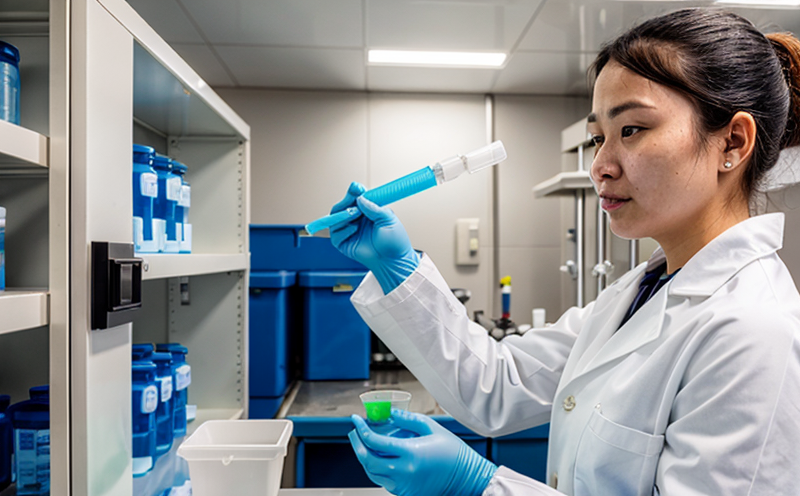USP Pathogen Screening Testing
The United States Pharmacopeia (USP) Pathogen Screening Testing is a critical component of ensuring the safety and quality of pharmaceutical products. This testing protocol is designed to identify potential pathogenic microorganisms that could pose risks during the manufacturing, storage, or use stages of drug products. The primary objective is to protect public health by preventing the release of contaminated materials into the market.
Pharmaceutical companies are required to adhere strictly to USP guidelines as part of their quality control measures. Pathogen screening ensures that not only do the active ingredients meet purity and potency standards, but also that any excipients or contaminants introduced during production processes do not compromise product safety. The testing process involves a series of steps aimed at detecting harmful bacteria, viruses, fungi, and parasites.
The methodology typically includes sample collection from various stages of the manufacturing process, including raw materials, intermediates, and final products. Samples are then processed using advanced microbiological techniques to identify potential pathogens. This can involve culture-based methods where samples are incubated under controlled conditions to grow any present microorganisms, followed by identification through biochemical tests or molecular diagnostics.
Another approach is the use of rapid detection systems that leverage technologies like PCR (Polymerase Chain Reaction) and mass spectrometry for quicker identification and quantification. These methods offer high sensitivity and specificity, making them invaluable in ensuring early detection of pathogens. Additionally, some laboratories employ ATP bioluminescence testing to assess microbial load on surfaces or equipment.
The importance of USP Pathogen Screening Testing cannot be overstated. It plays a vital role in maintaining the integrity of pharmaceutical products and upholding the highest standards of healthcare. By adhering to these stringent protocols, manufacturers can mitigate risks associated with potential contamination, thereby safeguarding public health.
Given the complexity of modern drug manufacturing processes, it is essential for companies to partner with laboratories that possess extensive experience in this area. These labs should have state-of-the-art facilities equipped with the latest instrumentation and expertise to handle diverse sample types effectively. Furthermore, they must stay updated on the latest USP guidelines and best practices.
Pharmaceutical testing is a multifaceted endeavor requiring rigorous standards and meticulous attention to detail. The success of any drug product hinges upon thorough quality assurance measures like pathogen screening. By investing in comprehensive testing services, manufacturers can ensure not only compliance with regulatory requirements but also the continuous improvement of their products.
Applied Standards
The USP Pathogen Screening Testing adheres to several internationally recognized standards that guide its implementation. The most prominent among these are:
- USP 1230 – Microbial Enumeration Methods: This standard provides guidelines for counting viable microorganisms in samples, which is crucial for assessing the microbial load.
- USP 1235 – Sterility Testing of Biopharmaceuticals and Biologics: It outlines procedures for ensuring that biopharmaceutical products are free from viable microorganisms.
- ISO 14698-1:2007 – Cleanroom Classification: This standard ensures that the environmental conditions in cleanrooms meet stringent requirements, which is essential for preventing contamination during testing and manufacturing processes.
These standards are integral to ensuring consistent and accurate pathogen screening results. They provide a framework for laboratories to follow when performing these tests, thereby enhancing reliability and reproducibility across different facilities.
Scope and Methodology
The scope of USP Pathogen Screening Testing encompasses the identification and quantification of pathogenic microorganisms in various pharmaceutical products. This includes:
- Raw materials and excipients.
- In-process samples from various stages of manufacturing.
- Finished drug products, both solid oral dosage forms and biopharmaceuticals.
The testing process begins with sample collection, which involves precise sampling techniques to ensure representativeness. Samples are then processed using a combination of culture-based methods and rapid detection systems. Culture-based methods involve incubating samples under controlled conditions to allow any present microorganisms to grow, followed by identification through biochemical tests or molecular diagnostics.
Rapid detection technologies, such as PCR and mass spectrometry, offer faster results with high specificity and sensitivity. These methods are particularly useful for detecting known pathogens quickly, allowing for timely corrective actions if contamination is identified. Additionally, ATP bioluminescence testing can be used to assess microbial load on surfaces or equipment.
Once the microorganisms have been detected and identified, laboratories must determine their concentration levels using appropriate techniques. This information is then compiled into detailed reports that serve as a basis for decision-making regarding product release or rework.
Eurolab Advantages
At Eurolab, we pride ourselves on offering comprehensive and reliable USP Pathogen Screening Testing services. Our advantages are numerous:
- Experienced Laboratory Team: Our team comprises highly skilled microbiologists and technicians with extensive experience in pharmaceutical testing.
- State-of-the-Art Facilities: Equipped with the latest instrumentation, including advanced culture-based methods, rapid detection systems like PCR and mass spectrometry, and ATP bioluminescence testers.
- Comprehensive Reporting: We provide detailed reports that not only outline test results but also offer recommendations for corrective actions if necessary.
- Regulatory Compliance: Ensuring strict adherence to all applicable USP guidelines and standards, including USP 1230, 1235, and ISO 14698-1:2007.
- Continuous Quality Improvement: Regular training sessions for our staff and continuous updates on the latest testing methodologies to maintain our leading edge in pharmaceutical testing.
We understand the critical importance of pathogen screening in maintaining product safety and quality. By partnering with Eurolab, you can rest assured that your products will undergo thorough and reliable testing, ensuring compliance with regulatory requirements and safeguarding public health.





